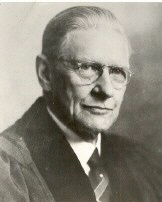

Some missionaries are known for their great fruit, their many
converts, churches they started, or hospitals they helped build. Samuel
Zwemer is not known for these things. After 38 years of missions work
throughout Arabia, the Persian Gulf, Egypt and Asia Minor, Samuel had
seen his efforts produce fewer than 12 conversions to Christianity.
Yet producing converts was not the ultimate goal for Samuel. The man
who would become known as the Apostle to Islam wrote "The chief end
of missions is not the salvation of men but the glory of God." We
are faithful to God's call on our lives for no other ultimate goal than
that of bringing glory to God.
As an infant, Samuel's mother prayed that he would become a
missionary. During his senior year at Hope College, Samuel dedicated
himself foreign missionary service and later found a companion in this
mission during his first year at New Brunswick Theological Seminary.
James Cantine and Samuel covenanted with each other to "go to some
needy field and possibly start a new work."
The pair selected Arabia as their destination because, as the
homeland of Islam, it was the most difficult mission field they could
find. They submitted their plans to different societies, including the
American Missionary Society, but found no one willing the sponsor them.
They were told it was foolish "to want to go to such a fanatical
people."
In reply, Samuel said, "If God calls you and no board will send
you, bore a hole through the board and go anyway." And that's what
they did. James solicited support from churches for Samuel, and Samuel
visited congregations to secure funds for James and together they
started the Arabian Mission.
Trial and hardship were present companions to Samuel on the mission
field. A partner in the early days of the mission died suddenly after a
short illness and was believed to have been poisoned. Samuel's younger
brother, Peter, became ill and died in 1898, just six years after
joining the mission.
In another six years, Samuel's two young daughters were to die of
dysentery. In the midst of this suffering, Samuel and his wife, Amy,
marked their daughters' graves with an affirmation of God's sovereignty:
"Worthy is the Lamb to receive riches."
When Samuel returned to the United States for a furlough in 1905, he
accepted a call to the Student Volunteer Movement as a traveling
representative for recruitment. For the next five years, Samuel spent
the greater part of his time speaking at conventions around the world
influencing many to go into missionary service before returning himself
to the mission field in Arabia.
Samuel would continue speaking at missions conferences for the rest
of his life and was the keynote speaker at the first Inter-Varsity
Student Foreign Missions Fellowship Convention, which became Urbana.
Throughout his life, Samuel would remain an advocate for missions
work in the Muslim world. The year before he died, he was scheduled to
attend Urbana '51 as a Special Guest, but was unable to due to illness.
He died quietly while recovering from a heart attack in New York in 1952.
<information from
https://urbana.org/go-and-do/missionary-biographies/faithful-hero; photo from
http://jointarchives.org/collections/registers/wts/zwemer.html>
|